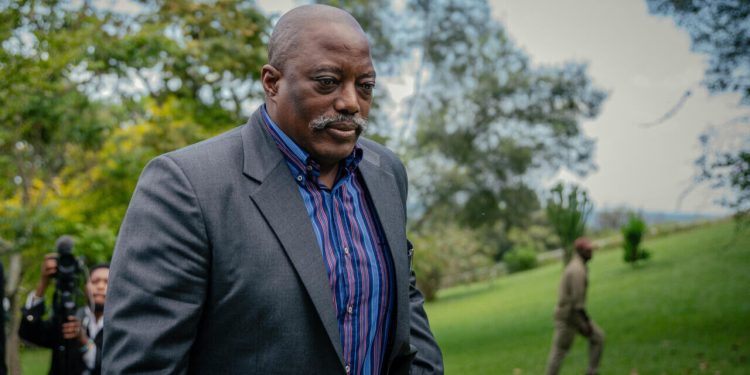The treason trial of former Democratic Republic of Congo (DRC) President Joseph Kabila opened on Friday in Kinshasa before a military court, marking a historic and seismic shift in Congolese politics. Kabila, who led Africa’s second-largest nation from 2001 to 2019, faces a barrage of serious charges, including treason, rape, murder, torture, and collusion with insurrectionist forces, over a legacy many now view as inextricably linked with the country’s decades-long descent into chaos.
Though he was absent from court, his name echoed through the halls of justice, dragging with it decades of pain, bloodshed, and broken promises in a country long plagued by instability, foreign interference, and a spiralling humanitarian crisis. The charges are more than just legal; they represent a national reckoning.
This article traces the genesis of these charges, contextualises the Congolese conflict, and explores how Joseph Kabila allegedly became entangled in war crimes and treasonous behaviour. It also charts the historical milestones of the conflict and proposes practical pathways for peace in the DRC.
What Are The Charges Against Joseph Kabila
The indictment reads like a tragic history of the DRC itself: treason, participation in an armed rebellion, the unlawful occupation of Goma by rebel forces, rape, murder, and torture of civilians. According to military prosecutors, Kabila is accused of either directly orchestrating or tacitly enabling the rise of armed groups, particularly during and after the M23 rebellion, and allegedly benefiting from conflict minerals in eastern Congo.
Key among the allegations is Kabila’s supposed role in the 2012 capture of Goma, North Kivu’s capital, by the M23 rebel group. Intelligence reports and UN experts long suspected high-level collusion between government insiders and rebel commanders, an allegation now formally leveled against the former president.
Kabila is also accused of deliberately sabotaging disarmament programs, fostering impunity, and ordering extrajudicial killings of both combatants and civilians during his tenure. For survivors, this trial is not just about accountability, it’s about healing decades of trauma.
The Roots of the Congo Conflict And The Kabila Family
To understand the magnitude of the Kabila case, one must first understand the history of conflict in the DRC. The seeds of war were planted long before Joseph Kabila’s presidency, during the dictatorial reign of Mobutu Sese Seko (1965–1997), whose kleptocracy impoverished the nation and fueled ethnic tension.
The First Congo War (1996–1997) saw Laurent-Désiré Kabila, Joseph Kabila’s father, backed by Rwanda and Uganda, overthrow Mobutu. This led to the Second Congo War (1998–2003), often called the “African World War,” involving nine nations and over 25 armed groups. An estimated 5 million people died, mostly from disease and starvation.
Joseph Kabila took over in January 2001 after his father was assassinated. At just 29, he was seen as a symbol of hope. But that hope quickly dimmed.
Kabila’s presidency was initially welcomed. He signed the 2002 Sun City Peace Accord and oversaw the transition to democracy, culminating in the 2006 elections, the DRC’s first in over 40 years. However, the hope for peace soon unravelled.
The M23 Rebellion (2012–2013)
The most damning chapter in the charges against Kabila centres on the March 23 Movement (M23), a rebel group formed by former Congolese army officers of Tutsi origin. The group mutinied over unmet promises from the government regarding integration and amnesty.
In November 2012, M23 captured Goma, a strategic city home to more than a million people, without much resistance from government troops. UN investigators linked the group to Rwanda and Uganda, but the Congolese government was also suspected of allowing the occupation to serve political ends.
The fall of Goma remains a deeply traumatic episode for the Congolese. Reports of mass rapes, looting, and executions flooded international media. The current charges argue that Kabila willfully enabled, or at the very least, failed to stop, the occupation.
Eastern Congo is rich in minerals such as coltan, gold, and cobalt. Kabila’s administration is accused of benefiting from illicit mining deals with armed groups, effectively funding warlords in exchange for political loyalty or financial gain. Several leaked reports, including those from the UN Group of Experts and Global Witness, indicate that the presidency may have operated a parallel economy through proxies and shell companies.
Kabila’s last years in office were marred by political repression. He overstayed his constitutional mandate by two years, sparking deadly protests across the country. Security forces allegedly carried out summary executions, arbitrary arrests, and enforced disappearances. The charges now before the court suggest these acts were not isolated incidents but part of a broader state policy of intimidation and violence.
What The Military Court Trial Means
Kabila’s trial, though controversial, represents a groundbreaking moment in African jurisprudence. Rarely have sitting or former African heads of state faced treason charges in domestic courts. The proceedings could serve as a test case for national accountability mechanisms, circumventing the need for international tribunals.
Still, skeptics warn of politicisation. Kabila remains a powerful figure, with loyalists still embedded in the security sector and the Senate, where he serves as a senator-for-life. His absence from the trial, citing security and political persecution concerns, further complicates matters.
Key Milestones in the Congolese Conflict
- 1996: First Congo War begins; Mobutu is ousted by Laurent Kabila.
- 1998–2003: Second Congo War engulfs the region; peace deals slowly bring formal hostilities to an end.
- 2001: Joseph Kabila assumes the presidency after his father’s assassination.
- 2006: First multi-party elections held; Kabila wins.
- 2012: M23 rebels capture Goma; accusations of collusion with Congolese elites emerge.
- 2013: M23 is defeated by UN-backed Congolese forces.
- 2016–2018: Kabila delays elections; violent crackdowns occur nationwide.
- 2019: Félix Tshisekedi takes office in a controversial power-sharing arrangement with Kabila’s coalition.
- 2024–2025: Mounting evidence leads to indictment; military court begins trial in Kinshasa.
The DRC has suffered one of the world’s worst humanitarian crises. Over 6 million people have died due to conflict and related causes since 1998. As of 2025, more than 6.9 million Congolese remain internally displaced, the highest number in Africa. Mass rapes, child soldier recruitment, and famine have become tragically common, particularly in North Kivu, Ituri, and South Kivu.
Joseph Kabila’s trial has sent shockwaves across the Great Lakes region. Rwanda and Uganda, both frequently implicated in fueling instability in the DRC, have issued cautious statements. The African Union and United Nations have welcomed the move but urged the Congolese judiciary to ensure fairness and impartiality.
The case may also set a precedent for other former leaders accused of crimes against humanity. Some African observers compare it to Hissène Habré’s conviction in Senegal in 2016, a moment of continental legal pride.
What Ought To Be Done In The Pursuit Of Peace?
While the trial of Joseph Kabila represents a critical milestone in the pursuit of justice and national healing, it alone cannot resolve the deep-rooted challenges that have plagued the Democratic Republic of Congo for decades. True and lasting peace in the DRC demands more than symbolic accountability; it requires a comprehensive and systemic transformation of the country’s political, economic, and security architecture. Only by addressing the underlying structural failures can Congo hope to escape the cycles of violence, corruption, and impunity that have defined its modern history.
A foundational pillar of this transformation must be the strengthening of democratic institutions. Over the years, weak electoral systems, a compromised judiciary, and a rubber-stamp parliament have allowed authoritarianism to take root under various regimes. To reverse this trajectory, the DRC must undertake genuine electoral reforms that guarantee credible, free, and fair elections. Judicial independence must be restored through transparent appointment processes, improved funding, and protection from political interference. Furthermore, the role of parliament must evolve beyond symbolic oversight to genuine legislative scrutiny, ensuring that future leaders adhere strictly to constitutional term limits, uphold the rule of law, and govern with transparency and accountability.
Another critical area of reform lies in the disarmament and reintegration of former combatants. The DRC is home to dozens of armed groups, many of which were created or co-opted during Kabila’s era and continue to terrorize communities, particularly in the east. A robust Disarmament, Demobilization, and Reintegration (DDR) strategy is vital. Such a program must not only provide economic alternatives and vocational training for ex-fighters but also ensure psychosocial support and community-based reintegration efforts that help rebuild trust and social cohesion. Without a sustained investment in rehabilitation and reconciliation, former rebels may simply shift allegiance or return to arms, perpetuating insecurity.
Congo’s vast mineral wealth, its so-called “resource curse”, must be transformed into a blessing for its people. For decades, the exploitation of gold, coltan, cobalt, and other minerals has served as a lifeline for warlords, corrupt politicians, and foreign interests. Establishing transparent and equitable governance over natural resources is therefore non-negotiable. The government should prioritize the implementation of open-contracting principles, publish all mining and oil agreements, and strengthen regulatory oversight of the extractive sector. Moreover, the creation of a national resource revenue authority, independent from political influence, would help ensure that mineral revenues are invested in public services and infrastructure rather than siphoned off into private coffers.
Equally essential is fostering regional cooperation to address the transnational dimensions of Congo’s instability. The porous borders shared with Rwanda, Uganda, Burundi, and South Sudan have enabled the cross-border movement of arms, rebels, and illicit minerals. A new, binding security framework, possibly under the auspices of the African Union or the International Conference on the Great Lakes Region, should be developed to facilitate intelligence sharing, coordinated border patrols, and mutual accountability for states that fund or harbor rebel groups. Diplomatic engagement, trust-building initiatives, and joint economic ventures could also help convert historic rivalries into opportunities for regional integration.
While the ongoing military trial signals a strong commitment to domestic justice, Congo must consider strengthening its legal arsenal through international partnerships. The sheer scale and complexity of the crimes committed, many of which constitute crimes against humanity, may necessitate the establishment of hybrid tribunals combining Congolese and international judges, prosecutors, and investigators. Such structures would not only lend credibility to proceedings but also provide technical expertise, logistical support, and protection mechanisms often unavailable in national courts. Additionally, collaboration with bodies like the International Criminal Court (ICC) and the United Nations could reinforce Congo’s commitment to upholding international legal norms.
While prosecuting a former president for treason and war crimes is undeniably historic, the road to national renewal is long and fraught with challenges. The DRC must seize this moment to pursue broader reforms that lay the groundwork for sustainable peace, inclusive governance, and economic justice. Without these complementary measures, the trial risks being seen as an isolated event, rather than the beginning of a much-needed transformation for a nation that has suffered for far too long.
What Happens Next?
As the trial unfolds, Joseph Kabila’s legacy hangs in the balance. To his critics, this is long-overdue justice for a man whose rule brought incalculable suffering. To his supporters, it’s a politically motivated witch-hunt designed to neutralize a still-influential figure.
Either way, the stakes are enormous. The Democratic Republic of Congo stands at a crossroads, one road leading toward truth, reconciliation, and reform; the other toward vengeance, instability, and continued bloodshed.
Whether Joseph Kabila is found guilty or not, the trial itself sends a powerful message: no leader is above the law, and the Congolese people deserve both truth and justice.
ALSO READ: 2 Million Goma Residents Cut Off From Food Supply












